A contributed article authored by by Patricia Hendricks, Danielle Smith, Michael Friedl, and Michael Smith. All four Sensei began their Aikido journeys in the early 1970s and have been prominent teachers in the community for decades.
The Universal Love of “Ai Ki” is all pervasive; it not defined by space or distance. On behalf of all beings we offer a prayer of deep gratitude, inspired by the teaching of O-Sensei, at this time of sequestering: “Now and again, it is necessary to seclude yourself among deep mountains and hidden valleys to restore your link to the source of life.’’ And so it is.
75 years ago, O-Sensei had a vision for the world to enter an era of peace. His work creating and spreading aikido has transformed Japan and the martial arts community all over the world.
If he were alive today, what would O-Sensei offer as guidance in the face of this global crisis? Perhaps he would say: “Aikido is a technique to neutralize and overcome this pandemic. It’s a way to unite the world in dealing with this challenge as one family.” Through our practice and what we have internalized, O-Sensei lives in us. What can we choose from our training to experience the challenges of this time and create new practices?
There are both positive and challenging aspects arising from the rapid spread of the virus. Positive benefits could include having more time with our loved ones, gardening, reading, listening more intently, meditating, praying, and practicing mindfulness. As we contemplate the nature of this unknown threat to our very existence, we ask what happens next. As in our aikido training, we make choices about how we train. We continue in our daily lives to have the ability to choose how we use our time in a positive way.
Let’s look together at what challenges we face. By illuminating a treasure of principles, we can learn to accept any situation with love and empathy. Through this blend, we can use the practice to transform our experience into one that creates less stress, improves our mood, and has positive effects on our health and well-being. How we apply our practice of aikido is up to each of us, individually, even as our practice emanates and permeates globally.
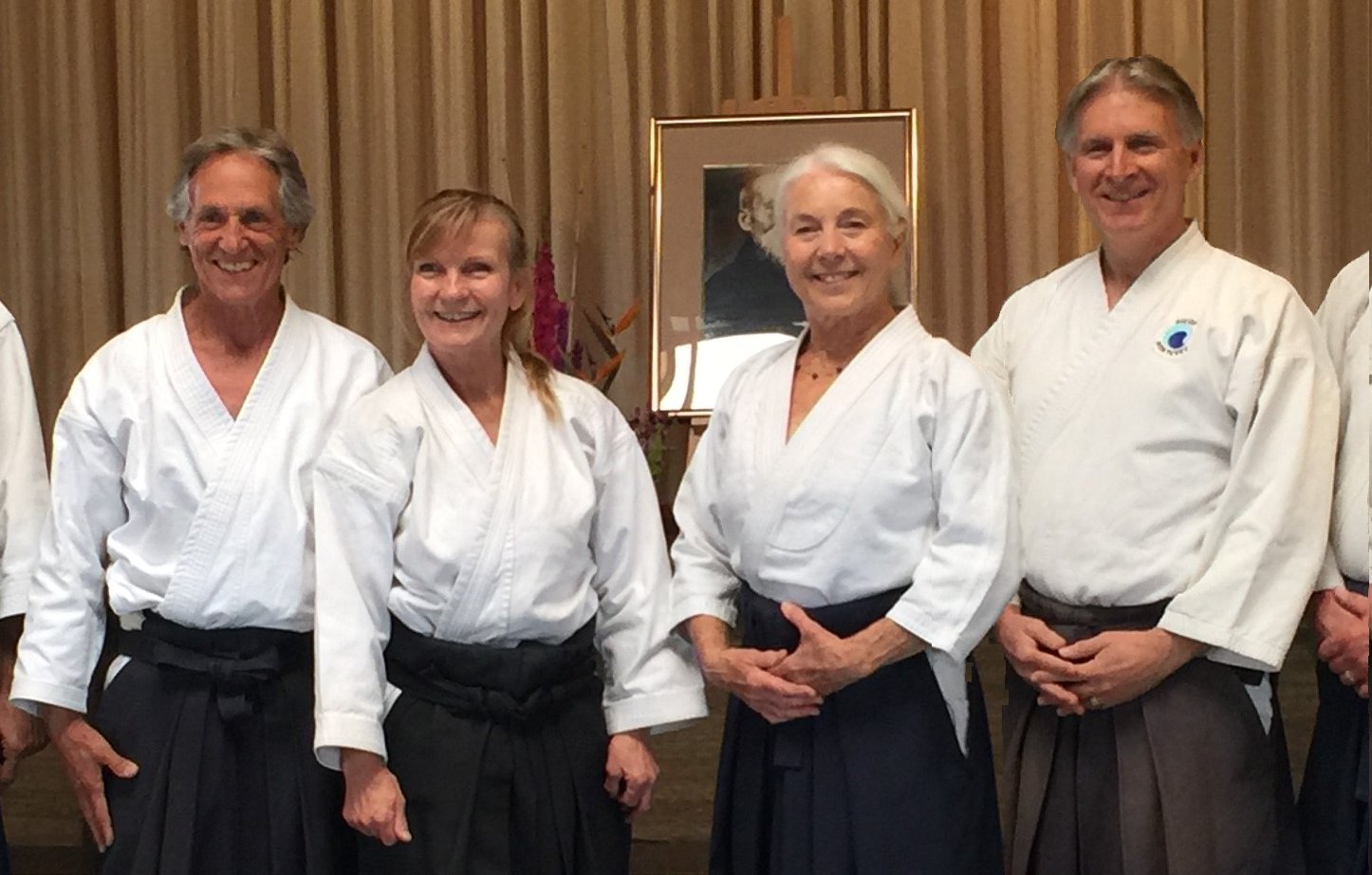
We begin with ourselves
Although there are cases of children and teens hospitalized as a result of this virus, the majority who become seriously ill and possibly die from this virus are elderly and/or have compromised immune systems. Dictionary.com offers this definition of the immune system: “…a diffuse, complex network of interacting cells, cell products, and cell-forming tissues that protects the body from pathogens and other foreign substances, destroys infected and malignant cells, and removes cellular debris…” This life protecting system is complex and interactive in our bodies, like the amazing flow of aikido practice. We know that people can recover from the coronavirus. We are learning that there are possible treatments in our world to balance and counter the spread of this powerful virus, even something as familiar as vitamin C.
Aikido training involves and affects the physical, mental, emotional, and spiritual elements of our being. Off the mat, these same categories of practice can be applied to support and boost our immune systems.
- Physical: how the body can achieve a state of homeostasis and boost its immune system
- Mental: how your thoughts and opinions affect your immune system
- Emotional: how your moods and emotional state can elevate or weaken your immune system
- Spiritual: how our prayers and contemplations can prevent illness and heal our immune system
- Physical
This is the easiest category to understand as the pros and cons are very straight forward. If we were not experiencing some variation of “shelter in place,’ we would be on the mat, training and feeling good.
Continue to move, to exercise – outside if possible
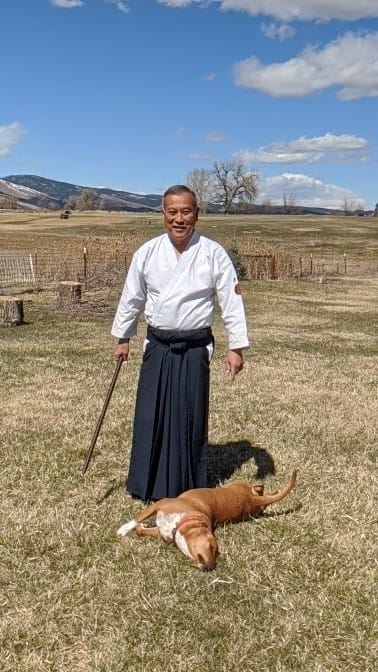
Motomichi Anno Sensei says, “Our relationship to nature is profound…. everything, and everyone, co-exists. … A tree is alive with the energy of the universe. Human beings are the same. We borrow the energy of all things in the universe. A mysterious power sustains our lives.”
Take your bokken or jo with you on a walk. Practice jo kata, suburi, and solo practice of kumijo and kumitachi. Try doing a weapon’s kata that you know well starting on the opposite side. Watch aikido videos, or on-line classes, and practice without a partner. Practice the two-step. You can practice both the uke and the nage slowly to understand the subtleties of the technique. A solo aikido practice similar to tai chi can be found for free at the Aikido of Ashland YouTube channel. The video is called “Meditation in Motion.”
Nutrition
Eat Supportive foods. One simple way is to eat non-processed, non-GMO, humanely raised, and natural whole foods, including veggies, fruits, proteins, grains, and dairy – that wondrous complex in our bodies, needs nourishment.
Antioxidants, to fight inflammation. Blueberries are the highest, then coffee, green tea, matcha tea, and cocoa. Eat chocolate, 70% cacao and higher. Also cut down on sugar – an immune depressor (though some would argue that if it makes you happy, it boosts your immune system – you have to work out that slippery slope yourself).
Probiotics: fermented foods such as yogurt, kefir, Belgian beer, and miso. In conjunction with prebiotics: fiber-rich food such as onions, oatmeal, asparagus, apples. Immunity begins in the gut.
Supplements, there are many helpful ones. If you do not take any during this time, at least take C, D, and A. See your health care provider for dosages higher than recommended.
- Mental
We know that stress affects the body in many ways. When we are in a stressful situation we forget to center and relax, and our breathing may become shallow or erratic. If we can remember, on a daily basis, to receive energy, be vulnerable in an appropriate way, and use our center to relax our body, we could possibly be enhancing our immune system.
Use this time to develop that knowledge or skill you’ve always wanted to pursue but could not find the time.
Read O-Sensei’s Memoir of the Master, and other writings that give you more insight into who O-Sensei was and why he felt strongly about aikido and its ability to change and shape the world.
Remember: energy follows attention. In our daily practice, we train to be aware of where our attention is. Does our attention focus on harmony, our center, on looking good, on our frustration, fear, or perhaps defeating our partner? If we feel caught by a grab, we truly are caught. But are we truly incapable of moving? If we resist or blame someone for our situation, we are stuck in that situation. Any form of resistance, creates stress and affects our immune system and blocks our access to joy. O-Sensei created a martial path of no resistance so that we could live each moment in gratitude and not fight it or correct it — “true victory is victory over ourselves.” If we are angry or scared, we have to ask ourselves, “Where is my attention? Is it adding to what I want to have happen or to what I fear?”
- Emotional
When our body is in the fight or flight mode our sympathetic system turns on. Adrenaline is released and our immune system is compromised. Often our fears and emotions are suppressed to create an image of strength. If we can learn to express our deepest fears and emotions to a trusted adult, a friend, and/or a therapist, our immune system doesn’t have to work so hard. We have the opportunity to voice our fears and frustrations, perhaps even our anger due to the mandate of a lockdown and isolation that is the end result of our limited ability to socialize. Aikido is about blending, seeing situations from another person’s perspective, and finding the greater harmony.
Here are some things to help you if you are feeling down or depressed:
- Don’t forget to cry. The release of sadness, fear, anger and grief can give you a whole new perspective.
- Do connect with people and pets. Call, FaceTime, use Zoom to stay connected to your family, friends, dojo, and loved ones. Give your pets physical affection, which actually releases endorphins in the brain, making you feel happy.
- Listen to your favorite music or dance or sing.
- Take a walk, exercise and/or move as you like.
- Spiritual
Everyone’s spiritual practice is different and varied. Yet there are many common spiritual techniques that can be practiced at any time each day.
Mindfulness and empathy are two attributes that one can practice on their own. Think of your choices in terms of kindness and dealing with the unknown.
Inspirational time-outs – Fortunately there are lots of prayers and songs being shared on the internet which can lend support to this complex environment.
Breath – the coronavirus is a reminder to breathe, remain centered, and be grateful for our life-giving and cleansing breath
Soji – the imperative is to frequently cleanse ourselves and our environment. With mindfulness we can turn this into a spiritual practice. We can use this time to work on ridding our lives of that which doesn’t contribute to realizing our higher selves.
We are connected
Likewise, it is important that we renew, maintain, expand, and strengthen our connections with family, friends, and community. As we focus on our own healing and strengthening, the energy of our shared practice helps us feel our connection and thus, heals our global family.
- Physical
Donate blood. Offer time in service to those in need (e.g. grocery shopping for a shut-in neighbor). Contribute resources to relief organizations.
- Mental
Actively participate in on-line classes. Find ways to share your talents, knowledge, and experiences with others, such as writing, painting, music, or creating a video.
- Emotional
Only share positive, uplifting messages on social media. Remember: “laughter is the best medicine” – share it.
- Spiritual
Find and join opportunities for World prayer/visualization. Maintain social proximity (of the Heart).
In Conclusion
Together we can face the challenges presented by the coronavirus using the principles that O-Sensei taught: Love, compassion, and the knowledge that we are all one, can heal the world we live in now.
We now know that, when an epidemic starts, staying at home, keeping our distance from everyone we can, keeping a clean and sanitized living environment, and implementing frequent and proper hygiene practices are outside factors that we can control. This will help us limit the transmission of the coronavirus. If we look inside, our immune system and organs can be strengthened by natural foods and supplements. In addition, our mental, emotional, and spiritual states can positively affect our immune system. It has been said “All we have is our health.” If we can learn to strengthen our immune systems, at any age, we might have a better chance of navigating through a pandemic such as this.
Through aikido, our connection to our own body, other human beings, and with nature will inspire us to live our lives with hope. We can be role models to others demonstrating love, compassion, and kindness in a world that has changed dramatically.
What we need is to understand how the art of peace that O-Sensei spoke of can transform our world into one of balance and harmony. This balance must be with all beings in order to honor the principles of nature. As we navigate this pandemic, love, compassion and transformation are the seeds that will bloom and bear fruit in this world.
Patricia Hendricks Sensei asked her son, David Connor, who is now sequestered with his colleagues from Cal Maritime U., on a ranch in Utah, to say some wise words from the “Youngins” (under 30 years of age). “Stay active! Go Outside! Go for hikes and bike rides! Enjoy the sunset. Calm down and breathe. Use this time for reflection and let your mind settle. This could be the longest break you have for a while!”

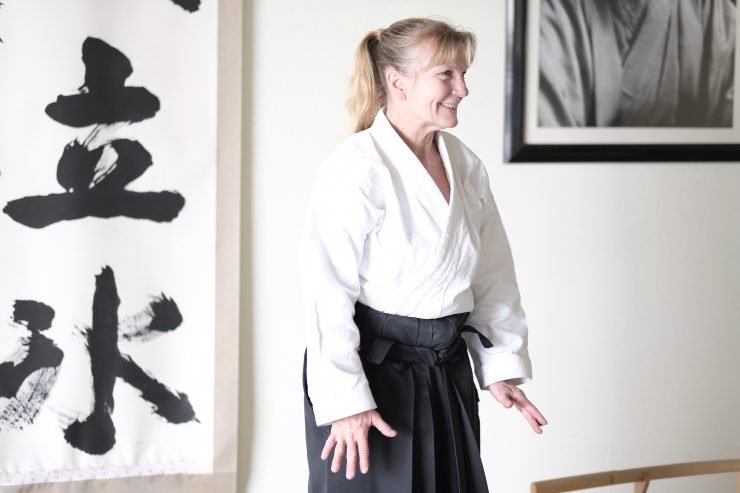

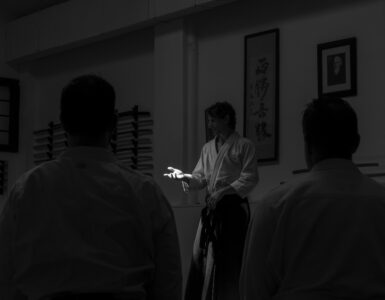
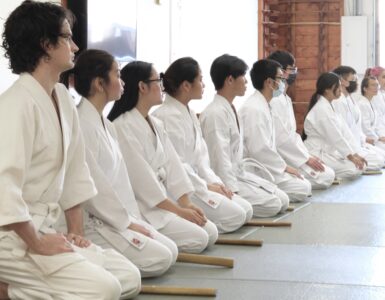
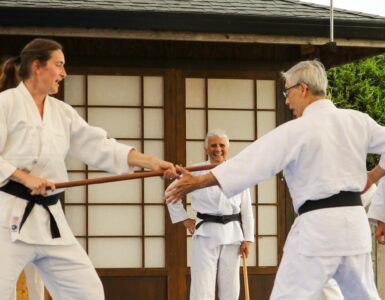

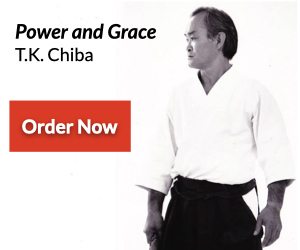
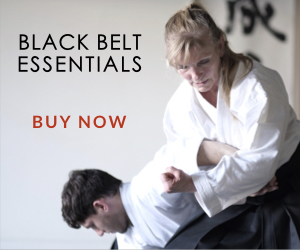




Great article, thank you so much.
Wonderful support and words of wisdom from our teachers who show that they have even more within them than the multitude of technical skills they have imparted to us over the decades.
I particularly relate to the suggestion for donating blood. I finally got off my butt to donate, heeding the call from local blood services who were running low.
Here in Calgary they were well organized, safe and rigorously sterile (in a good way!). I left feeling that in this time of chaos and enforced isolation one can still act thoughtfully and with care and do something useful.
Good morning Gold Sensei:
Thank you for a wonderful, touching and teaching article from some of the greats of this generation. I am always enlightened and provided with food for thought by the many interviews and teachings published by the Aikido Journal.
I have been an avid reader of Aikido Journal since the early 80’s.
Patrick Auge Sensei has been my teacher since 1981. As a prolific, knowledgeable and one of most devoted living students of Mochizuki Sensei, he continues to teach and evolve Mochizuki Sensei’s Yoseikan Aikido . Living as an uchi deshi for more than seven years and returning to study every year for three months until Mochizuki Sensei’s death, he has studied and developed Mochizuki Sensei’s teaching. I would like to suggest publishing some of his old interviews with Mr. Pranin.
Also, I think it might be interesting for the Aikido community to have a current interview published.
Thank you for your time and leadership,
Joseph
Thank you for such a wonderful and positive message. I miss having a place where I can go and practice Aikido with others. I’ve worked with various martial arts before and none ever seem to compare. When the pandemic is over, I may take a drive and go see if one can be found, even if it is an hour away or more.